初升高衔接语法 动词时态和语态 (四川省泸州市龙马潭区)
文档属性
| 名称 | 初升高衔接语法 动词时态和语态 (四川省泸州市龙马潭区) |  | |
| 格式 | rar | ||
| 文件大小 | 51.6KB | ||
| 资源类型 | 教案 | ||
| 版本资源 | |||
| 科目 | 英语 | ||
| 更新时间 | 2007-09-09 09:52:00 | ||
图片预览


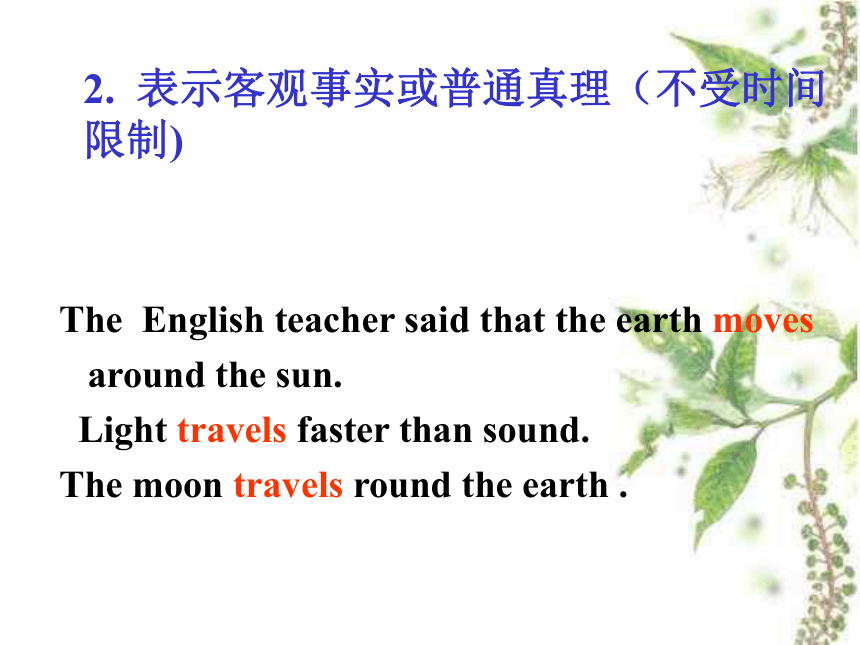
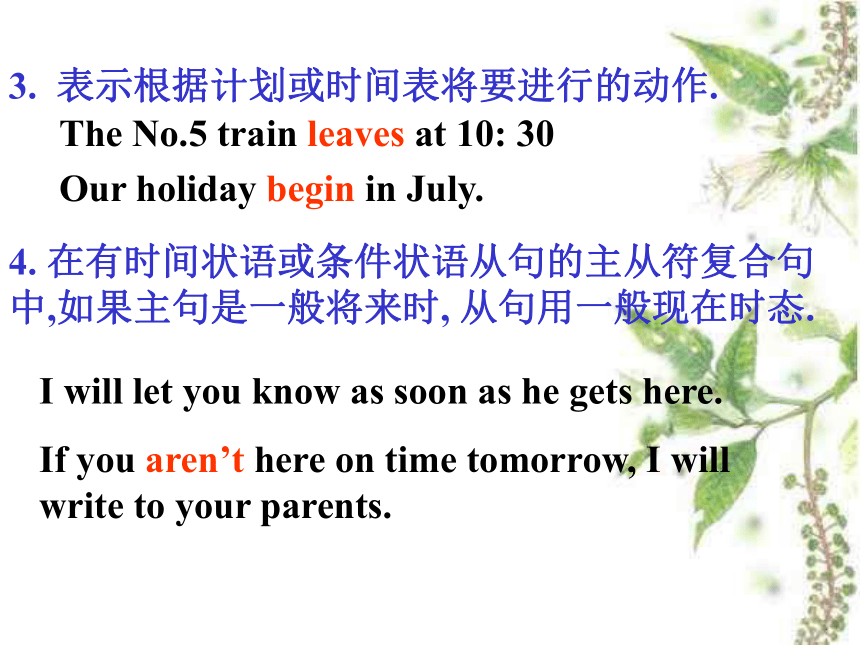
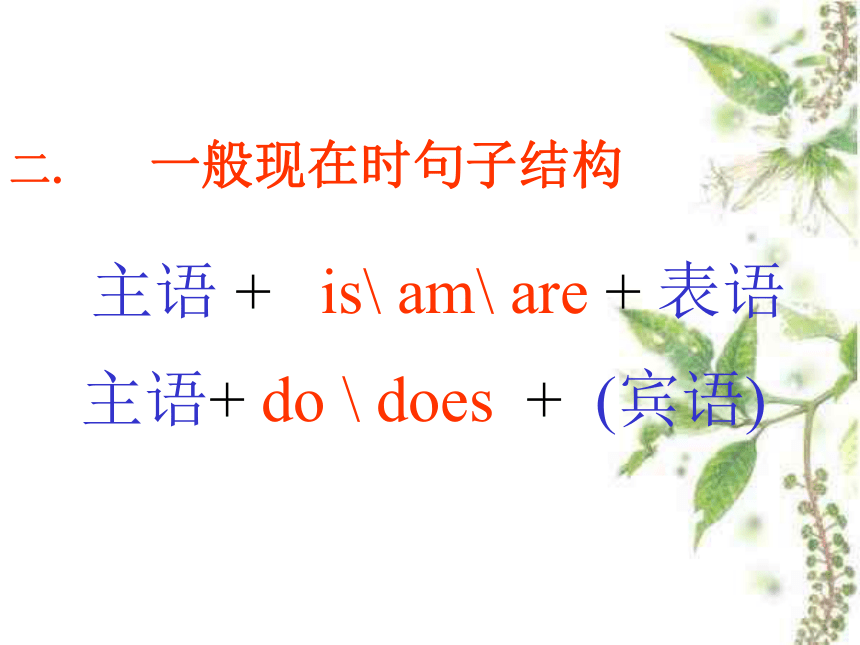
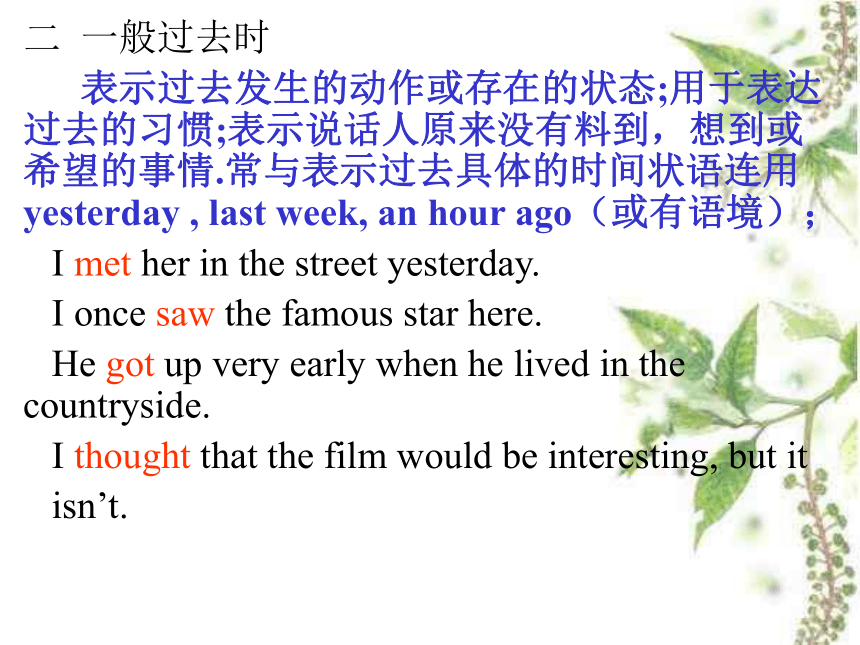
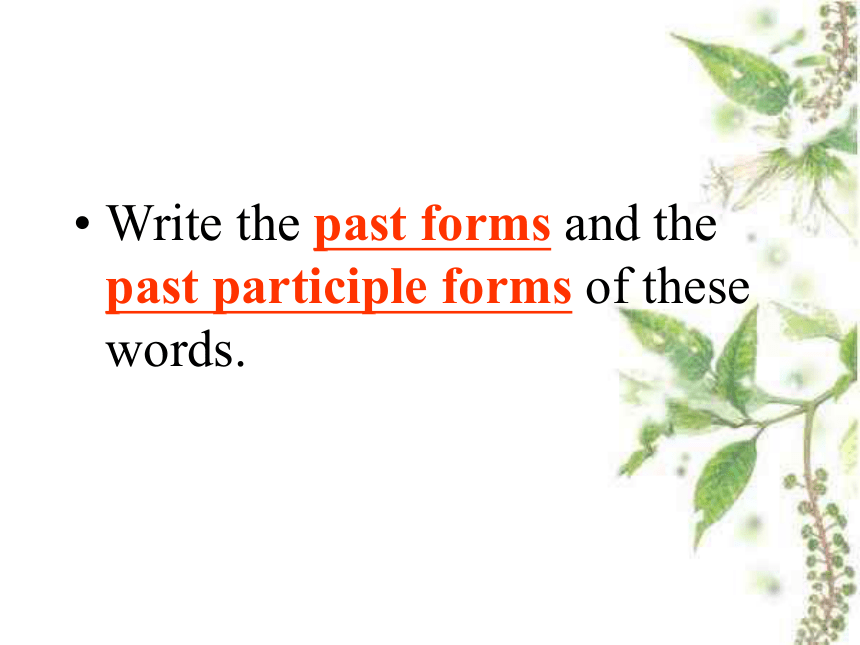
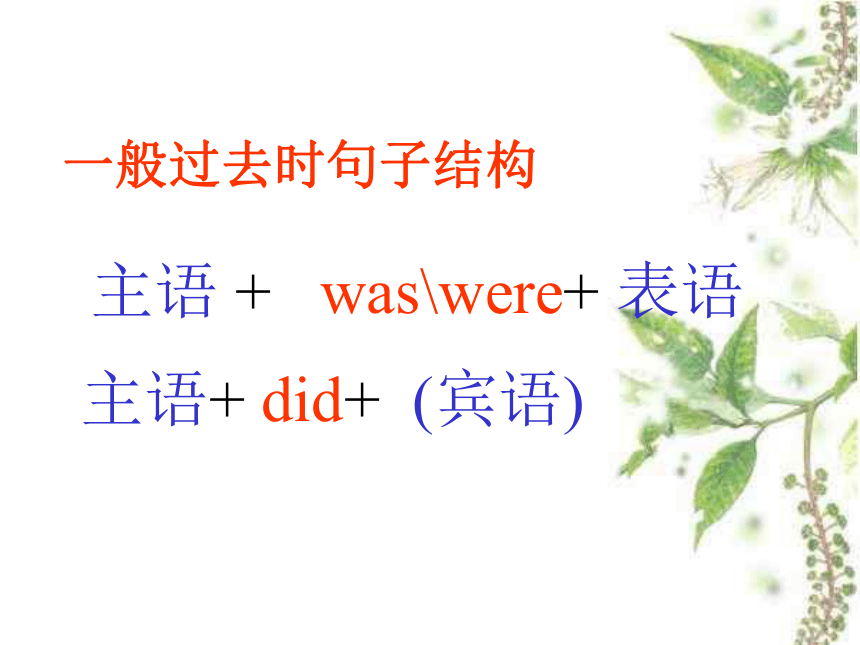
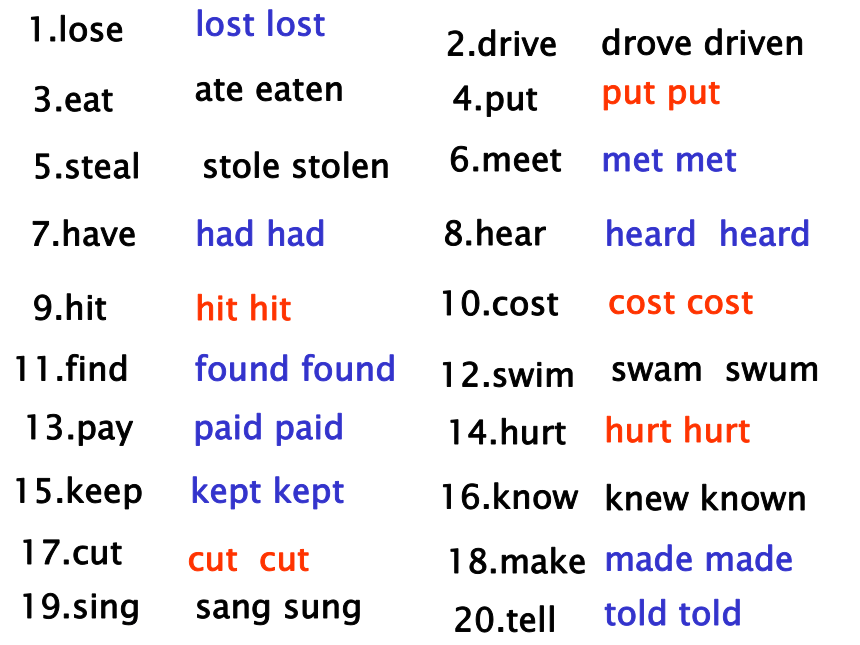
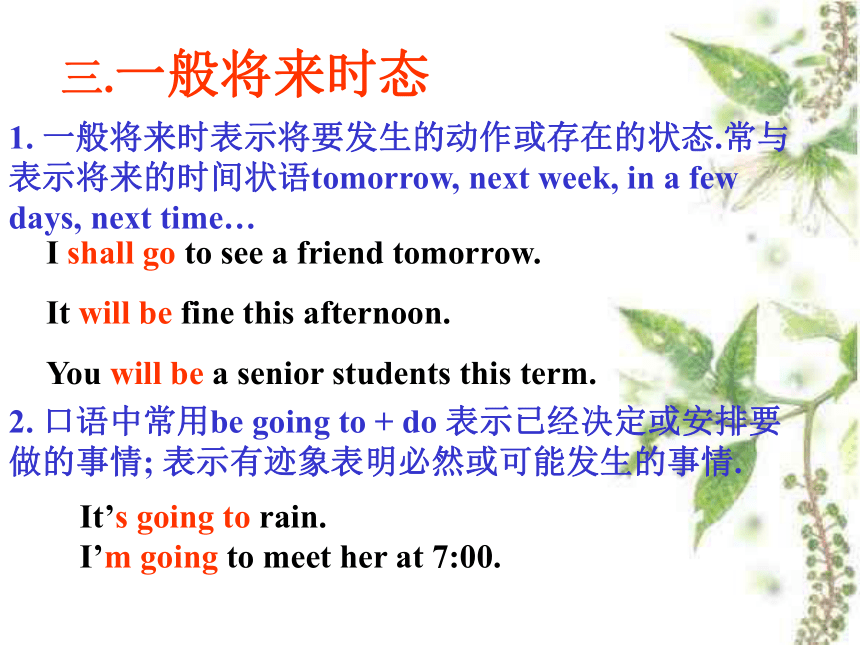
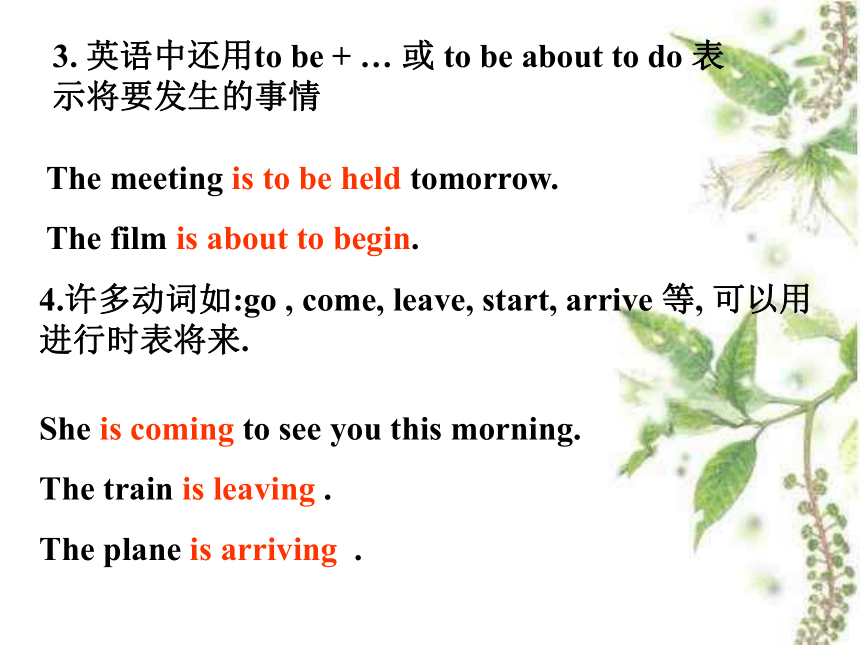
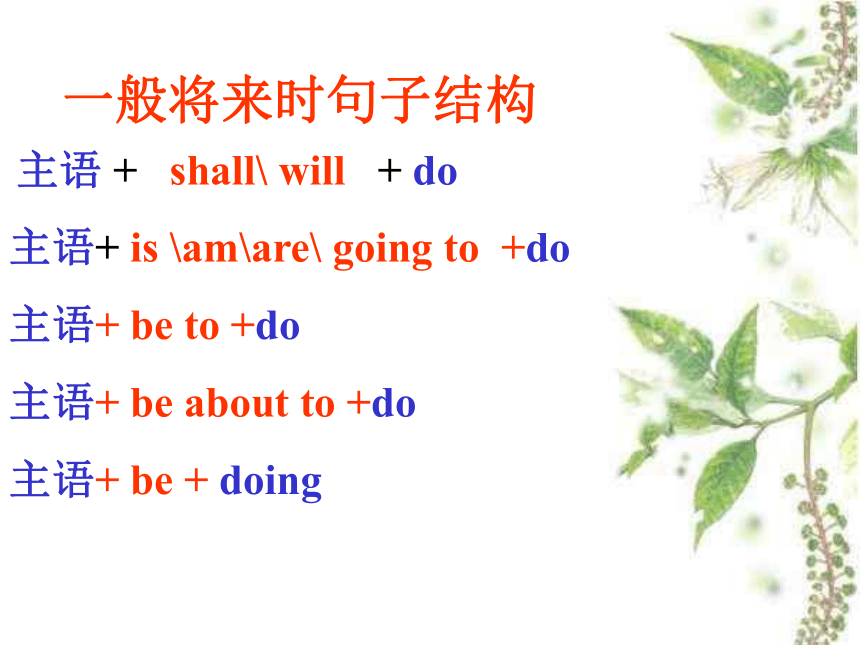
文档简介
课件42张PPT。 初升高衔接教学(二)
动词的时态、语态 动词的时态和语态
一 一般现在时的考点分析
1.表示经常发生的动作(习惯性的动作)或存在的状态.常always ,usually, often ,sometimes, everyday 等词连用.We study English every day .
Beijing is the capital of China .
My mother always gets up early.
He sometimes goes to see a film with his parents.
The English teacher said that the earth moves
around the sun.
Light travels faster than sound.
The moon travels round the earth .
2. 表示客观事实或普通真理(不受时间限制)
The No.5 train leaves at 10: 30
Our holiday begin in July.
3. 表示根据计划或时间表将要进行的动作.4. 在有时间状语或条件状语从句的主从符复合句中,如果主句是一般将来时, 从句用一般现在时态.I will let you know as soon as he gets here.
If you aren’t here on time tomorrow, I will write to your parents.
二. 一般现在时句子结构 主语 + is am are + 表语
主语+ do does + (宾语)二 一般过去时
表示过去发生的动作或存在的状态;用于表达过去的习惯;表示说话人原来没有料到,想到或希望的事情.常与表示过去具体的时间状语连用yesterday , last week, an hour ago(或有语境);
I met her in the street yesterday.
I once saw the famous star here.
He got up very early when he lived in the countryside.
I thought that the film would be interesting, but it
isn’t.
Write the past forms and the past participle forms of these words.
一般过去时句子结构 主语 + waswere+ 表语
主语+ did+ (宾语)1.lose 2.drive lost lostdrove driven3.eatate eaten 4.put put put5.stealstole stolen 6.meet met met 7.have had had 8.hear heard heard9.hithit hit10.costcost cost11.findfound found12.swimswam swum13.pay15.keep17.cut19.singpaid paidkept keptcut cutsang sung14.hurthurt hurt16.knowknew known18.makemade made20.telltold told
三.一般将来时态 1. 一般将来时表示将要发生的动作或存在的状态.常与表示将来的时间状语tomorrow, next week, in a few days, next time…I shall go to see a friend tomorrow.
It will be fine this afternoon.
You will be a senior students this term.
2. 口语中常用be going to + do 表示已经决定或安排要做的事情; 表示有迹象表明必然或可能发生的事情.It’s going to rain.
I’m going to meet her at 7:00.
3. 英语中还用to be + … 或 to be about to do 表示将要发生的事情
The meeting is to be held tomorrow.
The film is about to begin.4.许多动词如:go , come, leave, start, arrive 等, 可以用进行时表将来.She is coming to see you this morning.
The train is leaving .
The plane is arriving .
一般将来时句子结构 主语 + shall will + do
主语+ is amare going to +do
主语+ be to +do
主语+ be about to +do
主语+ be + doing
四 现在进行时
1 表示说话时正在发生着的一个动作:表示现阶段但不一定是发生在讲话时;表近期特定的安排或计划; go ,come等起止动作可用进行时代替将来时。如:
It is raining now.
He is teaching English and learning Chinese.
I am meeting Mr. Wang tonight.
We are leaving on Friday.
At six I am bathing the baby.
The girl is always talking loud in public.
(与频度副词连用,表示经常,反复的动作或某种感彩如厌恶, 欣赏,表扬等)
2 下列动词不可用进行时。
表示心理状态,情感的动词:like, love,hate, care, remember, believe, want, mind, wish, agree, need, mean.表感官的动词:see, hear, notice, feel, smell,
Sound, taste, look, watch.
【1】 Our teacher,Miss Chen,_________English on the
radio the day before yesterday.[2003 北京海淀区]
A.teaches B.taught?
C.will teach D.had taught? ? 巩固练习----一.单选
【3】 —When will you tell him the good news??
—I will tell him about it as soon as he_____back.
[2003 福州]?
A.comes B.came?
C.will come D.is coming?
B【2】 —Excuse me.Look at the sign NO PHOTOS!?
—Sorry,I_________it.[2003 重庆]?
A.don't see B.didn't see?
C.haven't seen D.won't see? BA 4.I don 't know if my friend_________.If he _________,I'll let you know.?
A.comes,comes B.comes, will come?
C.will come,comes D.will come,will come5.Sorry,I____to help you at ten.I was busy at the momen?
A.won't come B.can't come?
C.didn't come D.shouldn't come?6.There_________two meetings tomorrow afternoon.?
A.are going to be B.are going to have?
C.is going to be D.will have?CCA7.Kate_________to bed until her mother_________back.?
A.won't go,come B.hadn't gone came?
C.went,came D.didn't go,came?8.It_________7 hours to go to Nanjing by train.?
A.takes B.is taking? C.has taken D.took?
9.—How much do you want??
—I think ten dollars_________ enough.?
A.is B.are? C.has been D.have beenDAA二.用所给词的适当形式填空
1. People _________ (eat ) three meals a day and have to _________ ( drink ) a lot of water.
2. Look! The students in our class _______________ ( water ) the young trees.
3. In about five years , students _________ ( do ) their homework on computers.
4.It _____ ( take ) him half an hour to finish the drawing .
5. The watch __________ ( go ). I can hear the ticks.
6. Do you know where he _______ ( live ) now ?
7. If it doesn’t rain tomorrow, we _______ ( visit ) the Great Wall.
8. Miss Gao _______ ( study ) English on the radio every morning.
9. He ______________________ ( always ask ) me the same question.
10. Look ! The tree ________________ ( fall ) down. eat drink are watering will do took is going lives will visit studies is always asking is gong to fall
动词的时态和语态
第二课时
5.过去进行时:表示过去某个时刻或某段时间内正在进行的动作。动词的构成为:be(was/were)+doing;过去进行时的时间状语常用,at eight yesterday,morning,from 7:00 to ?9:00 last night, 有时用when,while连词引导的状语从句表示:过去进行时可用来叙述过 ?去经常或反复发生的动作,What were you doing at half past ten yesterday morning ?
I was learning a new song at that time.
When Tom came in , I was reading a novel.
It was raining when he left my home.
I haven’t seen her for a long time.6. 现在完成时:表示过去发生但与现在有联系的动作或状态,强调对现在的影响和结果。现 ?在完成时动词的结构为:have/has+done(过去分词),现在完成时的标志词常有:already,yet,ever,never,just,before等;现在完成时还可表示过去开始、持续到现在的动作或状态,常与for,since短语连用,句中动词一般为延续性 动词;否定句可用短暂性动词,for加段时间,since后加点时间或一般过去时的句子 I have read the book.
He has opened the door.
Have you seen a book here ?
I have lived here since my childhood.
We have learned English for four years.
It has been ( is ) six years since he left here.非延续动词的转化:
Come ---
Go leave ---
Buy ---
Begin---
Die---
Join the army---
Catch a cold---
Borrow--- be in… be awayhave be on be dead be in the army be a soldier have a cold keepbe和go的现在完成时区别;have /has been to 表示“去过某地”,已回来;have/has gone to表示“已去某地” ?,已离开,没回来。 ?
She has gone to the hospital .
I have been to Beijing twice.
Where have you been ?
---Where is your mother ?
---She has gone to the cinema .
7.现在完成进行时: 表示动作从过去开始持续到现在,而且还可能持续下去. 结构为: have has been + doing I have been teaching English for sixteen years.
-- Where are you ? I have been waiting for you for two hours.
He has always been thinking of himself.8.过去完成时,表示在过去某一时间或动作之前已完成的动作或存在的状态。过去完成时的构成为:had+done;过去完成时的时间状语常用by加过去点时间,by the end of 加过去段时间,before加过去点时间表示,有时用when,before,after等引导的时间从句中。 ?
The students had finished their exercises before the teacher came .
She said she had not seen you for a long time.
I had read 15 English stories by the end of last term.
He had lived in the north for ten years before he moved here.9.过去将来时:表示过去看来将要发生的动作或存在的状态。过去将来时动词的构成为:would/should+do,也可用was/were going to+do;过去将was were about to do 来时一般用在从句中;一些表示位置移动的动词如:go,come,leave等可用过去进行时表示过去将来时。
The students wondered who would teach their English.
She said that she would come when she had time.
We were about to leave when it began to rain.
He said that there was going to be a film this weekend.
He said that he was coming.
am/is/are doingdidwill/shall doam/is/are going to dobe about to dobe to dodo/doeswas/were doingwould/should dohave/has donehad donewas/were going to dohave/has been doing动 词 时 态------------------------------do总结课时训练Ⅰ.用所给动词的适当形式填空。?
1.My brother isn't at home right now.He ___________(go)to Beijing.He___________(be) there many tines.He _________
(not be) back until next week.?
2.When I got home,my mother__________(go)out for a walk.?
3.He____________(finish)his composition just now.?
4. ______she _____(do) morning exercises every day?? has gonehas beenwon't behad gone finished Does do 课时训练5.She________ (watch)TV while she______________
(wash) her clothes.?
6.He said he_________ (give)her the present as soon as she ________(come)back.?
7.Listen!Someone____________(sing)in the next room.?
8.Our teacher told us the earth_______(go) around the sun.? ? watched was washingwould give came is singing goes Ⅱ.单项选择
?
1.He_______this pen for five years.He______it in 1997.?
A.has bought,bought. B.bought,bought?
C.has kept,has bought D.has had,bought?
2.She_________apples in her garden when I_________to see her yesterday.?
A.picked,went B.was picking, went?
C.picked,was going D.was picking,was going?
3.John said he_________ supper.He was quite full.?
A.had had B.was haring? C.had D.has eaten? 课时训练DBA?
4.It______3 years since I______to No.1 Middle School.?
A.is,come B.is,have come?
C.was,came D.is,came?
5.Father_________when I _________yesterday morning.?
A.still slept,got up? B.was still sleeping,got up?
C.is sleeping,got up? D.sleeps,get up?
5.Kate_________to bed until her mother_________back.?
A.won't go,come B.hadn't gone came?
C.went,came D.didn't go,came?
6.His brother_________from home for a long time.?
A.has left B.has been away?
C.left D.will leave? 课时训练(A)(D)(B)(D)(B)
第三课时
动词的语态 am/is/are doingdidwill/shall dodo/doeswas/were doingwould/should dohave/has donehad donecan do被动 语 态 ------------------------------be doneam/is/are donewas/were donewould/should be doneam/is/are being donewas/were being donehave/has been donehad been donewill/shall be donecan be donedo(1)This type of TV sets _______ well.
A.doesn’t sell B. don’t be sold C. aren’t sold D. not sell
2. The jacket _______ at a high price last winter.
A. sold B. was sold C. has been sold D. had sold 一些以主动形式表被动的动词: (往往后面跟副词)
keep, read, sell, iron, count, wash, look, clean, 1—A 2—B
They made us to clean the desks.
We were made clean the desks(by them).
I noticed him to run into the house.
4. He was noticed run into the house(by me).
感官动词:see, hear, feel, watch, notice,
使役动词:let, make ,have主动语态省to , 而被动语态不能省to .^^toto(2)(3)1.Do you like the material? Yes it _______ (feel) very soft.
2.– Do you like the fish?
-- Yes, very much as it_______( taste) good.系动词+形容词,不用被动语态
taste, feel, look, smell, sound,feelstastes(4)1. The Anti-Japanese war broke out in 1937.
2. The Anti-Japanese war was broken out in 1937.不用被动语态的动词:
belong to (属于),break out (爆发),
happen (发生), appear (出现),
last ( 延长), take place (发生),
cost(花费), burst out (迸发),1. The football match will be put off if it ______ (rain).
2. I’ll begin the class when you ______ (be) ready.
3. I’ll call you as soon as I ______ (come) back to Hangzhou.
4. He will stay up late till/until he ________ (finish) his homework. rainsarecomefinishes主句: 条件(时间)状语从句:一般将来时一般现在时(5)(6)1. The question is easy _______.
A. to be answered B. to answer
C. answering D. to answering
2.The water is hard to ___________.
drink B. drinking
C. drunk D. be drunk
1—B 2--A放在形容词后的不定式作状语不能用被动语态(7)He want _____(move) to France and marry the girl.
Your hairs wants _____(cut). You’d better have it done tomorrow.
--What happens to your shoes?
--They want ______ (mend).
to movecuttingmending人+ want to do sth,
物+ want doing(表被动)=want to be done(8)
The football match has begun for ten minutes.
He has joined the Party in 1998.
He has left Hangzhou for 7 days.
has been on(F)joined(F)(F)has been away from现在完成时态中在延续时间做时间状语的肯定句,谓语动词只能用延续性动词,而不能用短暂性动词.Homework:2.Finish all the grammar exercises on the paper.
动词的时态、语态 动词的时态和语态
一 一般现在时的考点分析
1.表示经常发生的动作(习惯性的动作)或存在的状态.常always ,usually, often ,sometimes, everyday 等词连用.We study English every day .
Beijing is the capital of China .
My mother always gets up early.
He sometimes goes to see a film with his parents.
The English teacher said that the earth moves
around the sun.
Light travels faster than sound.
The moon travels round the earth .
2. 表示客观事实或普通真理(不受时间限制)
The No.5 train leaves at 10: 30
Our holiday begin in July.
3. 表示根据计划或时间表将要进行的动作.4. 在有时间状语或条件状语从句的主从符复合句中,如果主句是一般将来时, 从句用一般现在时态.I will let you know as soon as he gets here.
If you aren’t here on time tomorrow, I will write to your parents.
二. 一般现在时句子结构 主语 + is am are + 表语
主语+ do does + (宾语)二 一般过去时
表示过去发生的动作或存在的状态;用于表达过去的习惯;表示说话人原来没有料到,想到或希望的事情.常与表示过去具体的时间状语连用yesterday , last week, an hour ago(或有语境);
I met her in the street yesterday.
I once saw the famous star here.
He got up very early when he lived in the countryside.
I thought that the film would be interesting, but it
isn’t.
Write the past forms and the past participle forms of these words.
一般过去时句子结构 主语 + waswere+ 表语
主语+ did+ (宾语)1.lose 2.drive lost lostdrove driven3.eatate eaten 4.put put put5.stealstole stolen 6.meet met met 7.have had had 8.hear heard heard9.hithit hit10.costcost cost11.findfound found12.swimswam swum13.pay15.keep17.cut19.singpaid paidkept keptcut cutsang sung14.hurthurt hurt16.knowknew known18.makemade made20.telltold told
三.一般将来时态 1. 一般将来时表示将要发生的动作或存在的状态.常与表示将来的时间状语tomorrow, next week, in a few days, next time…I shall go to see a friend tomorrow.
It will be fine this afternoon.
You will be a senior students this term.
2. 口语中常用be going to + do 表示已经决定或安排要做的事情; 表示有迹象表明必然或可能发生的事情.It’s going to rain.
I’m going to meet her at 7:00.
3. 英语中还用to be + … 或 to be about to do 表示将要发生的事情
The meeting is to be held tomorrow.
The film is about to begin.4.许多动词如:go , come, leave, start, arrive 等, 可以用进行时表将来.She is coming to see you this morning.
The train is leaving .
The plane is arriving .
一般将来时句子结构 主语 + shall will + do
主语+ is amare going to +do
主语+ be to +do
主语+ be about to +do
主语+ be + doing
四 现在进行时
1 表示说话时正在发生着的一个动作:表示现阶段但不一定是发生在讲话时;表近期特定的安排或计划; go ,come等起止动作可用进行时代替将来时。如:
It is raining now.
He is teaching English and learning Chinese.
I am meeting Mr. Wang tonight.
We are leaving on Friday.
At six I am bathing the baby.
The girl is always talking loud in public.
(与频度副词连用,表示经常,反复的动作或某种感彩如厌恶, 欣赏,表扬等)
2 下列动词不可用进行时。
表示心理状态,情感的动词:like, love,hate, care, remember, believe, want, mind, wish, agree, need, mean.表感官的动词:see, hear, notice, feel, smell,
Sound, taste, look, watch.
【1】 Our teacher,Miss Chen,_________English on the
radio the day before yesterday.[2003 北京海淀区]
A.teaches B.taught?
C.will teach D.had taught? ? 巩固练习----一.单选
【3】 —When will you tell him the good news??
—I will tell him about it as soon as he_____back.
[2003 福州]?
A.comes B.came?
C.will come D.is coming?
B【2】 —Excuse me.Look at the sign NO PHOTOS!?
—Sorry,I_________it.[2003 重庆]?
A.don't see B.didn't see?
C.haven't seen D.won't see? BA 4.I don 't know if my friend_________.If he _________,I'll let you know.?
A.comes,comes B.comes, will come?
C.will come,comes D.will come,will come5.Sorry,I____to help you at ten.I was busy at the momen?
A.won't come B.can't come?
C.didn't come D.shouldn't come?6.There_________two meetings tomorrow afternoon.?
A.are going to be B.are going to have?
C.is going to be D.will have?CCA7.Kate_________to bed until her mother_________back.?
A.won't go,come B.hadn't gone came?
C.went,came D.didn't go,came?8.It_________7 hours to go to Nanjing by train.?
A.takes B.is taking? C.has taken D.took?
9.—How much do you want??
—I think ten dollars_________ enough.?
A.is B.are? C.has been D.have beenDAA二.用所给词的适当形式填空
1. People _________ (eat ) three meals a day and have to _________ ( drink ) a lot of water.
2. Look! The students in our class _______________ ( water ) the young trees.
3. In about five years , students _________ ( do ) their homework on computers.
4.It _____ ( take ) him half an hour to finish the drawing .
5. The watch __________ ( go ). I can hear the ticks.
6. Do you know where he _______ ( live ) now ?
7. If it doesn’t rain tomorrow, we _______ ( visit ) the Great Wall.
8. Miss Gao _______ ( study ) English on the radio every morning.
9. He ______________________ ( always ask ) me the same question.
10. Look ! The tree ________________ ( fall ) down. eat drink are watering will do took is going lives will visit studies is always asking is gong to fall
动词的时态和语态
第二课时
5.过去进行时:表示过去某个时刻或某段时间内正在进行的动作。动词的构成为:be(was/were)+doing;过去进行时的时间状语常用,at eight yesterday,morning,from 7:00 to ?9:00 last night, 有时用when,while连词引导的状语从句表示:过去进行时可用来叙述过 ?去经常或反复发生的动作,What were you doing at half past ten yesterday morning ?
I was learning a new song at that time.
When Tom came in , I was reading a novel.
It was raining when he left my home.
I haven’t seen her for a long time.6. 现在完成时:表示过去发生但与现在有联系的动作或状态,强调对现在的影响和结果。现 ?在完成时动词的结构为:have/has+done(过去分词),现在完成时的标志词常有:already,yet,ever,never,just,before等;现在完成时还可表示过去开始、持续到现在的动作或状态,常与for,since短语连用,句中动词一般为延续性 动词;否定句可用短暂性动词,for加段时间,since后加点时间或一般过去时的句子 I have read the book.
He has opened the door.
Have you seen a book here ?
I have lived here since my childhood.
We have learned English for four years.
It has been ( is ) six years since he left here.非延续动词的转化:
Come ---
Go leave ---
Buy ---
Begin---
Die---
Join the army---
Catch a cold---
Borrow--- be in… be awayhave be on be dead be in the army be a soldier have a cold keepbe和go的现在完成时区别;have /has been to 表示“去过某地”,已回来;have/has gone to表示“已去某地” ?,已离开,没回来。 ?
She has gone to the hospital .
I have been to Beijing twice.
Where have you been ?
---Where is your mother ?
---She has gone to the cinema .
7.现在完成进行时: 表示动作从过去开始持续到现在,而且还可能持续下去. 结构为: have has been + doing I have been teaching English for sixteen years.
-- Where are you ? I have been waiting for you for two hours.
He has always been thinking of himself.8.过去完成时,表示在过去某一时间或动作之前已完成的动作或存在的状态。过去完成时的构成为:had+done;过去完成时的时间状语常用by加过去点时间,by the end of 加过去段时间,before加过去点时间表示,有时用when,before,after等引导的时间从句中。 ?
The students had finished their exercises before the teacher came .
She said she had not seen you for a long time.
I had read 15 English stories by the end of last term.
He had lived in the north for ten years before he moved here.9.过去将来时:表示过去看来将要发生的动作或存在的状态。过去将来时动词的构成为:would/should+do,也可用was/were going to+do;过去将was were about to do 来时一般用在从句中;一些表示位置移动的动词如:go,come,leave等可用过去进行时表示过去将来时。
The students wondered who would teach their English.
She said that she would come when she had time.
We were about to leave when it began to rain.
He said that there was going to be a film this weekend.
He said that he was coming.
am/is/are doingdidwill/shall doam/is/are going to dobe about to dobe to dodo/doeswas/were doingwould/should dohave/has donehad donewas/were going to dohave/has been doing动 词 时 态------------------------------do总结课时训练Ⅰ.用所给动词的适当形式填空。?
1.My brother isn't at home right now.He ___________(go)to Beijing.He___________(be) there many tines.He _________
(not be) back until next week.?
2.When I got home,my mother__________(go)out for a walk.?
3.He____________(finish)his composition just now.?
4. ______she _____(do) morning exercises every day?? has gonehas beenwon't behad gone finished Does do 课时训练5.She________ (watch)TV while she______________
(wash) her clothes.?
6.He said he_________ (give)her the present as soon as she ________(come)back.?
7.Listen!Someone____________(sing)in the next room.?
8.Our teacher told us the earth_______(go) around the sun.? ? watched was washingwould give came is singing goes Ⅱ.单项选择
?
1.He_______this pen for five years.He______it in 1997.?
A.has bought,bought. B.bought,bought?
C.has kept,has bought D.has had,bought?
2.She_________apples in her garden when I_________to see her yesterday.?
A.picked,went B.was picking, went?
C.picked,was going D.was picking,was going?
3.John said he_________ supper.He was quite full.?
A.had had B.was haring? C.had D.has eaten? 课时训练DBA?
4.It______3 years since I______to No.1 Middle School.?
A.is,come B.is,have come?
C.was,came D.is,came?
5.Father_________when I _________yesterday morning.?
A.still slept,got up? B.was still sleeping,got up?
C.is sleeping,got up? D.sleeps,get up?
5.Kate_________to bed until her mother_________back.?
A.won't go,come B.hadn't gone came?
C.went,came D.didn't go,came?
6.His brother_________from home for a long time.?
A.has left B.has been away?
C.left D.will leave? 课时训练(A)(D)(B)(D)(B)
第三课时
动词的语态 am/is/are doingdidwill/shall dodo/doeswas/were doingwould/should dohave/has donehad donecan do被动 语 态 ------------------------------be doneam/is/are donewas/were donewould/should be doneam/is/are being donewas/were being donehave/has been donehad been donewill/shall be donecan be donedo(1)This type of TV sets _______ well.
A.doesn’t sell B. don’t be sold C. aren’t sold D. not sell
2. The jacket _______ at a high price last winter.
A. sold B. was sold C. has been sold D. had sold 一些以主动形式表被动的动词: (往往后面跟副词)
keep, read, sell, iron, count, wash, look, clean, 1—A 2—B
They made us to clean the desks.
We were made clean the desks(by them).
I noticed him to run into the house.
4. He was noticed run into the house(by me).
感官动词:see, hear, feel, watch, notice,
使役动词:let, make ,have主动语态省to , 而被动语态不能省to .^^toto(2)(3)1.Do you like the material? Yes it _______ (feel) very soft.
2.– Do you like the fish?
-- Yes, very much as it_______( taste) good.系动词+形容词,不用被动语态
taste, feel, look, smell, sound,feelstastes(4)1. The Anti-Japanese war broke out in 1937.
2. The Anti-Japanese war was broken out in 1937.不用被动语态的动词:
belong to (属于),break out (爆发),
happen (发生), appear (出现),
last ( 延长), take place (发生),
cost(花费), burst out (迸发),1. The football match will be put off if it ______ (rain).
2. I’ll begin the class when you ______ (be) ready.
3. I’ll call you as soon as I ______ (come) back to Hangzhou.
4. He will stay up late till/until he ________ (finish) his homework. rainsarecomefinishes主句: 条件(时间)状语从句:一般将来时一般现在时(5)(6)1. The question is easy _______.
A. to be answered B. to answer
C. answering D. to answering
2.The water is hard to ___________.
drink B. drinking
C. drunk D. be drunk
1—B 2--A放在形容词后的不定式作状语不能用被动语态(7)He want _____(move) to France and marry the girl.
Your hairs wants _____(cut). You’d better have it done tomorrow.
--What happens to your shoes?
--They want ______ (mend).
to movecuttingmending人+ want to do sth,
物+ want doing(表被动)=want to be done(8)
The football match has begun for ten minutes.
He has joined the Party in 1998.
He has left Hangzhou for 7 days.
has been on(F)joined(F)(F)has been away from现在完成时态中在延续时间做时间状语的肯定句,谓语动词只能用延续性动词,而不能用短暂性动词.Homework:2.Finish all the grammar exercises on the paper.
